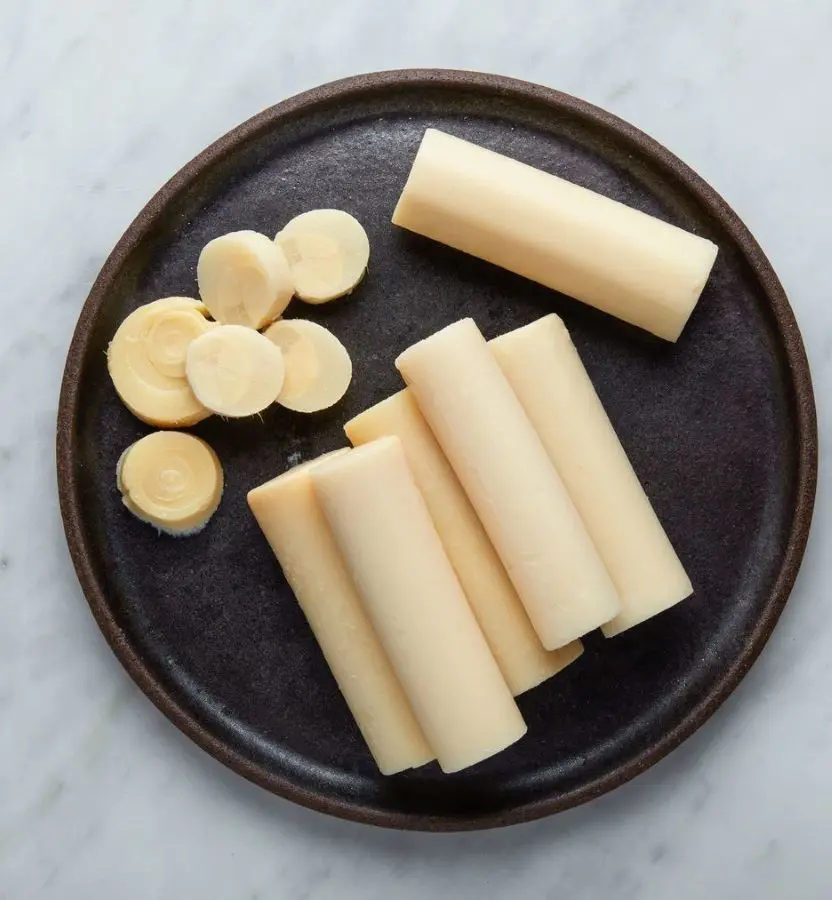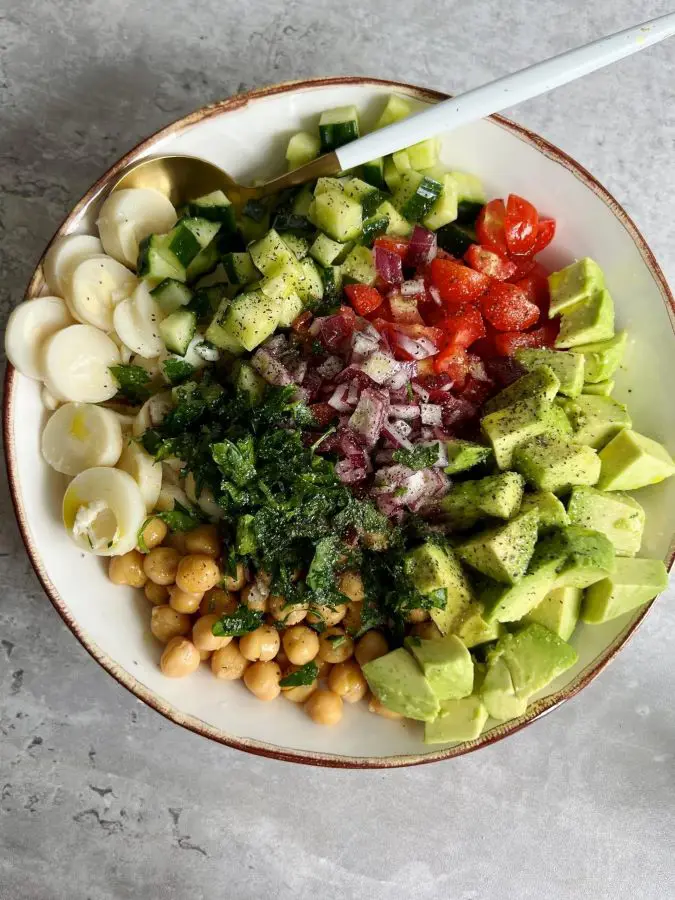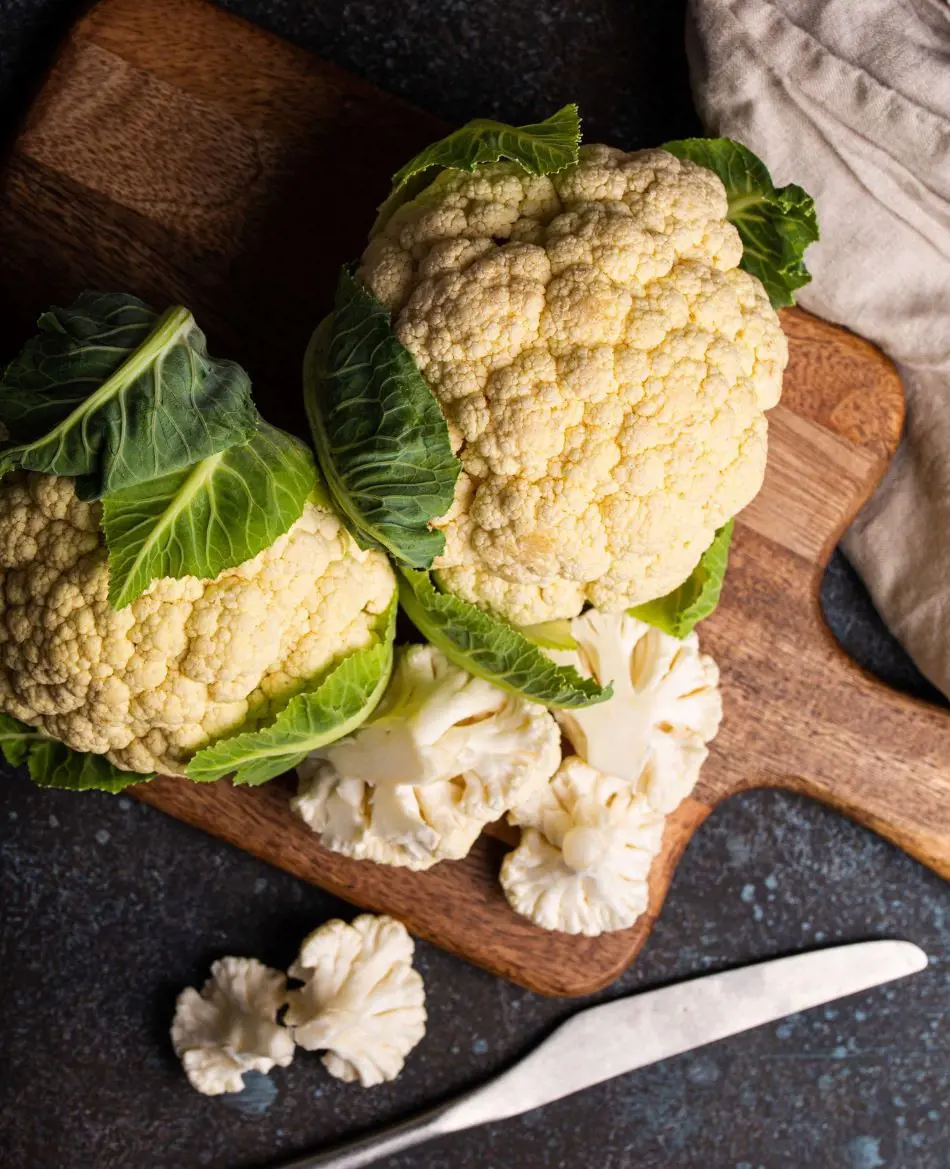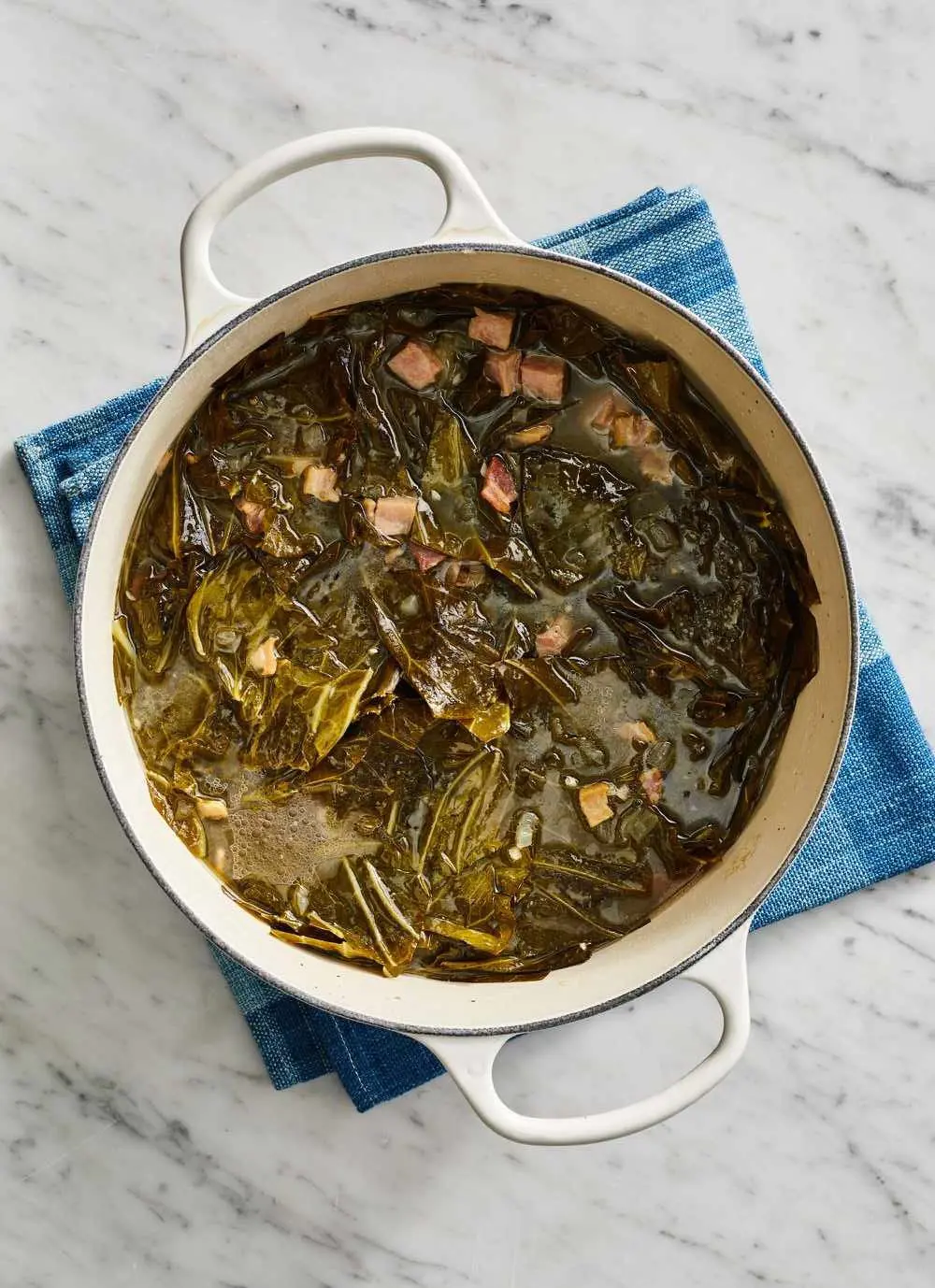15 Heart of Palm Health Benefits and Nutritional Value

Heart of palm, often referred to as the "vegetable of the tropics," is a delicious and nutritious treat that many people might not know about. This unique vegetable, harvested from the inner core of certain palm trees, boasts a mild, slightly sweet flavor and a tender, crunchy texture that makes it a delightful addition to salads, stir-fries, and more.
Beyond its taste, it is packed with health benefits and essential nutrients that support your well-being. In this article, we’ll explore 15 amazing health benefits and the nutritional value of this vegetable.
Nutritional Value Of Heart Of Palm
Heart of Palm is low in fat, carbohydrates, and calories while being rich in essential nutrients. Here is a breakdown of its nutritional content per 100 grams.
- Calories: 36
- Protein: 4 grams
- Fat: less than 1 gram
- Carbs: 4 grams
- Fiber: 4 grams
- Potassium: 38% of the Daily Value (DV)
- Phosphorus: 20% of the DV
- Copper: 70% of the DV
- Zinc: 36% of the DV
Health Benefits of Heart of Palm
As a result of its nutritional composition, the heart of palm has several health benefits for the human body. Some such benefits have been described below:
1. Supports Heart Health

Heart of palm is rich in potassium, a mineral that helps regulate blood pressure by counteracting the effects of sodium and easing tension in the blood vessel wall, improving circulation and reducing strain on the heart.
Likewise, this is also a good source of fiber, which helps lower cholesterol levels and reduces the risk of heart disease. Further, it contains chlorogenic acid, a polyphenol with antioxidant properties that may help prevent the buildup of plaque in arteries and lower blood pressure.
2. Boost Immune System
After seeing the nutritional profile of this plant it is easy to say that this is a powerhouse of nutrition. And all those nutrients give your immune system a much-needed boost. It is packed with vitamin C, which acts as a powerful antioxidant to fight off harmful free radicals and keep your cells healthy.
But that's not all, it also contains zinc, a mineral that plays a crucial role in maintaining a strong immune response. When you consume the heart of palm, these essential nutrients work together to help your body ward off infections and illness more effectively,
3. Aids In Weight Management
Incorporating heart of palm into your diet can be an effective strategy for weight management. Despite its low calories and fat content, this versatile vegetable can actually help you shed unwanted pounds in a few key ways.
First, this vegetable is high in fiber and water which promote feelings of fullness and satisfaction. By adding it to your meals, you're less likely to overeat or crave unhealthy snacks between meals.
Additionally, it contains minimal calories compared to many other foods, so you can enjoy larger portions without packing on extra weight. Simply swapping out higher calorie ingredients for heart of palm in dishes like salads, stir-fries, and dips can give your meals a nutritious boost while keeping calories in check.
4. Supports Bone Health

In addition to the benefits of hearts of palm, this vegetable plays a significant role in supporting bone health due to its rich content of essential minerals like manganese, calcium, and magnesium. Manganese is crucial for bone formation and metabolism, helping to maintain bone density and strength.
Likewise, calcium is well-known for its role in building and maintaining strong bones, while magnesium contributes to the structural development of bones and helps regulate calcium levels in the body.
Thus, by including heart of palm in your diet, you can ensure that you are getting these vital nutrients, which work together to promote healthy bones and reduce the risk of osteoporosis and fracture as you age.
5. Morning Sickness Relief
This beneficial vegetable can help relieve morning sickness due to its high content of vitamin B6, which is known for its anti-nausea properties. Many pregnant women experience nausea and vomiting during the early months of pregnancy, and vitamin B6 has been shown to alleviate these symptoms effectively.
When consumed, heart of palm provides a natural source of this essential vitamin, making it a beneficial addition to the diet for those struggling with morning sickness. In addition, pairing vitamin B6 with morning sickness with doxylamine, an antihistamine can further enhance its effectiveness in reducing nausea, making this vegetable a tasty and nutritious option for expectant mothers seeking relief from morning sickness.
6. Promotes Healthy Skin
Due to the richness of vitamins and antioxidants, the heart of palm promotes healthy skin. As we discussed, it is particularly high in vitamin C, which is essential for collagen production, helping maintain skin elasticity and firmness. Collagen is a protein that keeps skin looking youthful and reduces the appearance of wrinkles.
Additionally, it contains zinc, a mineral that supports skin healing and helps prevent acne by regulating oil production. The antioxidants found in this vegetable also combat free radicals, which can damage skin cells and accelerate aging.
7. Regulates Blood Sugar Levels

Foods that are low in carbohydrates are vital for managing blood sugar, as they prevent rapid spikes in glucose levels after meals and heart of palm is one of those foods.
Further, this vegetable has a low glycemic index, which means it has a minimal impact on blood sugar when consumed. The dietary fiber inside this vegetable also plays a significant role by slowing down the digestion and absorption of sugars, which helps maintain stable blood sugar levels.
This makes it a suitable option for individuals with type 2 diabetes for those looking to keep their blood sugar in check, allowing them to enjoy its nutritional benefits without the worry of significant glucose fluctuations.
8. Enhances Digestive Health
The dietary fiber in the heart of palm adds bulk to the stool, which promotes regular bowel movements and prevents constipation. This fiber acts as a prebiotic, which helps nourish the good bacteria in your gut, supporting a healthy microbiome.
A balanced gut microbiome is crucial for overall digestive health, as it aids in nutrient absorption and helps protect against digestive disorders. By incorporating this palm into your meals, you can savor its delicious flavor while also providing a beneficial boost to your digestion.
9. Supports Healthy Hair
Heart of palm supports healthy hair primarily due to its rich nutrient profile, particularly its high content of vitamins and minerals essential for hair growth and maintenance. It is a good source of zinc, which plays a crucial role in hair tissue growth and repair, helping to keep hair strong and healthy.
Additionally, it contains vitamins A and C, which are important for maintaining a healthy scalp and promoting hair follicle function. Vitamin A helps produce sebum, an oily substance that moisturizes the scalp, while vitamin C is vital for collagen production, which strengthens hair strands.
10. Good For Eye Health

Heart of palm is beneficial for eye health as it contains beta-carotene, a precursor to vitamin A, essential for maintaining good vision. Vitamin A helps prevent night blindness and supports overall eye function.
Besides, it is rich in antioxidants that combat oxidative stress, which can lead to eye problems such as cataracts and age-related macular degeneration. Its nutrient-dense profile, including vitamins and minerals, contributes to overall health, making it a valuable addition to a diet.
11. Antioxidant Properties
Rich in antioxidants, particularly polyphenols, which are plant compounds that help neutralize free radicals in the body. Free radicals are unstable molecules that can cause oxidative stress, leading to cellular damage and increasing the risk of chronic diseases such as cancer, diabetes, and heart disease.
By consuming this, you can benefit from these antioxidants, which may reduce inflammation and protect your cells from damage. Additionally, antioxidants, such as chlorogenic acid, have been noted for their anti-carcinogenic properties, further supporting overall health and well-being.
12. Tissue Repair
Due to its rich content of essential amino acids, heart of palm helps in tissue repair. These acids are crucial for various bodily functions, including the regeneration of damaged tissue. It contains all nine essential amino acids that the body cannot produce on its own, such as histidine, lysine, and valine.
These amino acids play a vital role in synthesizing proteins necessary for repairing tissues and maintaining overall health. By including this vegetable in your diet, you can provide your body with the necessary building blocks to facilitate effective tissue repair and recovery from injuries or stress.
13. Low Sodium Option
With only about 1.3 mg of sodium per 100 grams, it is a great alternative to many processed foods that are often high in sodium, which can contribute to hypertension and other health issues.
The low sodium content, combined with its high potassium levels, helps maintain a healthy balance of electrolytes in the body, supporting heart health by easing tension in blood vessels and reducing the risk of high blood pressure.
This makes heart of palm not only a delicious addition to various dishes but also a smart choice for anyone aiming to adopt a heart-healthy diet while enjoying flavorful meals.
14. Supports Healthy Metabolism
As a healthy vegetable, heart of palm supports in healthy metabolism. The fiber content in it aids digestion and promotes a feeling of fullness, helping control appetite and reduce overall calorie intake. They are also good sources of protein, which requires more energy to digest compared to fats and carbohydrates, thus boosting metabolic rate.
Similarly, it is low in calories while providing essential vitamins like B6, vital for the metabolism of fats, proteins, and carbohydrates. The combination of fiber, protein, low calories, and essential nutrients makes it an excellent choice for those looking to maintain or lose weight while supporting overall metabolic health.
15. Versatile And Delicious
Heart of palm is a highly versatile vegetable known for its delicious flavor and numerous culinary applications. It can be enjoyed in various ways, such as in salads, casseroles, or even as a meat substitute, making it an excellent addition to a wide range of dishes.
Its subtle taste and crisp texture allow it to absorb flavors well, enhancing the overall meal experience. Similarly, as we discussed, this vegetable is low in calories and fat while being rich in essential nutrients, which contributes to its appeal as a healthy ingredient in cooking.
Culinary Uses Of Heart Of Palm

Heart of palm is a versatile ingredient that can be used in various culinary preparations. Here are some popular ways to incorporate it into your diet:
Salads
Add sliced heart of palm to salads for a crunchy texture and unique flavor.
Stir-Fries
Include heart of palm in vegetable stir-fries for added nutrition and taste.
Ceviche
Use this vegetable as a substitute for seafood in vegetarian ceviche recipes.
Pasta Dishes
You can also mix this vegetable with pasta for a refreshing and healthy twist.
Sauteed
Saute the heart of palm with garlic and olive oil for a simple and delicious side dish.
How to select and store the Heart of Palm?
Here are the key points on how to select and store hearts of palm:
1. Selecting
- Choose moist, intact hearts of palm that are unblemished
- Avoid or discard bruised, overly soft, or spotted stalks
- Fresh hearts of palm are available but spoil quickly, so your best bet is a specialty produce store, online, or an ethnic market.
2. Storing
- Fresh Hearts of Palm: Refrigerate immediately after purchase. Likewise, unused, tightly sealed portions can be stored for up to 2 weeks in the refrigerator.
- Canned/Jarred Hearts of Palm: Store cans or jars out of sunlight at room temperature. Once opened, use it within 1 week and store it in the refrigerator.
Facts About Heart Of Palm
Here are some interesting facts about the heart of palm that many people don't know:
- These vegetables are harvested from the inner core and growing buds of certain palm trees, most notably coconut, jucara, acai palm, palmetto, and peach palm.
- Harvesting hearts of palm from wild single-stemmed palms usually results in the palm tree's death, but other palm species like peach palm are clonal or multi-stemmed and can be harvested without killing the entire plant.
- The peach palm (Bactris gasipaes) is the main variety that has been domesticated for the heart of palm production. It produces multiple stems, allowing producers to harvest several stems from one plant.
- It is an excellent source of protein, fiber, vitamins B2, B6, and C, as well as minerals like potassium, iron, zinc, phosphorus, and copper.
- A half-cup serving of canned heart of palm contains only 20 calories, 2 grams of protein, and 2 grams of fiber.
- Fresh hearts of palm are highly perishable, so they are usually pickled or canned to extend their shelf life. They can be eaten raw, but this is uncommon.
- It has a mild, delicate flavor similar to artichokes, with a slightly sweet and nutty taste. Its texture is comparable to a firm cucumber or jicama.
- This is a versatile vegetable that can be grilled, sauteed, boiled, or pickled. It is often used as a meat substitute in vegan or vegetarian dishes.
Recent posts
Nutrition
Nutrition
Licorice Root: Benefits And Uses
You can spell it liquorice or licorice; this herb or root has been in use for centuries in most medicinal applications, as a natural sweetener and to enhance flavors. Regarding its origins, it comes from the root of the "Glycyrrhiza galbre" plant and...
Nutrition
Is Salmon Good For You? Nutritional Facts and Benefits
Salmon fish is a staple diet throughout the world, popular as a super food for its nutrients. Whether savored in sushi, poached, grilled, roasted, or pan-fried, salmon offers minerals and vitamins that contribute to healthy bodily functions. In addit...
Nutrition
25 Smoked Salmon Recipes That You Will Enjoy
Salmon is a silver-colored fish that is loaded with many nutrients, vitamins, and omega-3 fatty acids. Smoked Salmon is better for improving your health and reducing the risk of cancer, heart-related diseases, fights inflammation, reduces anxiety and...
Nutrition
Are Sausages Healthy? Nutrition And Health Benefits
Sausages are tasty in an addictive way, making them one of the most popular foods worldwide. You may have enjoyed this convenient food often, whether on a bun with mustard or grilled on a barbecue, the simple preparation methods are what makes its co...
Nutrition
20 Vegetables That Are Rich In Iron
Iron is essential for our bodies to function well. When we don't get enough iron, we often feel weak and tired. It's important to address iron deficiency early by eating the right foods. Fortunately, many vegetables are rich in iron and can help prev...
Nutrition
15 Cauliflower Nutrition Facts And Health Benefits
Cauliflower, a cruciferous vegetable, resembles a white variation of its relative, broccoli. Like broccoli, it has closely bunched florets attached to a thick core, often surrounded by a few leaves. While white is the most common color, cauliflower i...







